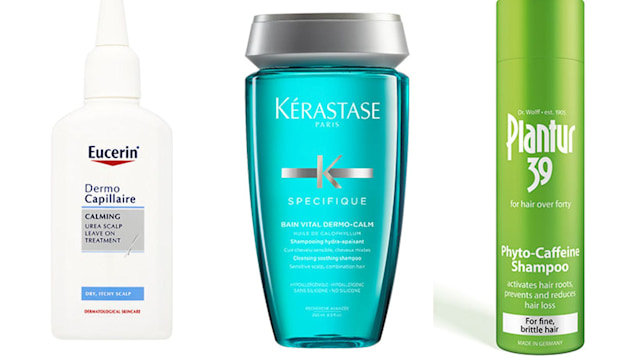If you want thick, healthy hair, the secret lies not in your shampoo and conditioner, but in keeping your scalp healthy. HELLO! Beauty Editor Nadine Baggott takes a look at how to finesse your follicles…
Whether it is due to over-processing or ageing, more and more women are complaining of having fine and thinning hair. However if your locks are less than luxuriant it is not your hair itself you should be blaming, but your scalp. And with the scalp concerns such as sensitivity and dandruff also on the rise, it is time to get to the root of the problem.
Eurecin Dermo Capillaire Calming Urea Scalp Treatment, £12 from Boots
"Your scalp is a living, breathing, active environment and things change it – that can be your hormones, your diet, the products you use on it, the weather, pollution, drugs you are taking…"
Never forget that it is your scalp that is the secret to healthy hair, not the actual hair, which is dead," explains Guy Parsons, the trichologist and hairdresser behind My Hairdoctor.
"I would estimate that around two-thirds of women have scalp problems, yet only 20 per cent admit it and seek help. Ask the right questions and you soon discover that many are concerned with a sensitive, itchy or dry scalp and often the thinning hair and hair loss that results."
Ikoo, £15.95, visit ikoo-brush.co.uk
It helps to understand the make up of your scalp, which is similar to skin but with one crucial difference. "Your scalp is cellular and those cells divide and shed at a different rate on each person, the same as the skin on your face and body," says Guy. "But on the rest of the body the process is helped along by exfoliating, wearing clothes and taking them off.
"If you don't wash your hair that often, the dead skin cells on your scalp can quickly and easily build up and clump, and you will see and feel that dead skin. This is what makes people scratch their scalp, then complain that it's red, flaking and even bleeding. This is annoying and unsightly and can lead to thinning hair if it clogs hair follicles."
According to Guy, the solution is two-fold: first, you need to try to deep-cleanse your scalp more often to keep it healthy; second, you should visit a trichologist if you have thinning hair. "By the time you see the change you will already have lost a significant amount," he says.
Kerastase Bain Vital Dermo-Calm, £17.90, from salons
The fact is that while we rarely go a day without cleansing our faces, many of us are too busy to wash our hair every day, or avoid doing so because we have dry, coloured hair or can’t style it ourselves. Although hair-washing every other day is fine, leave it too long and it can lead to scalp problems. Says Guy: "If you think about how filthy your face is at the end of a day spent commuting, working out, rushing around and sitting in an office surrounded by airborne dust and pollution, then imagine your scalp at the end of a week without a wash. It will be clogged with perspiration, sebum, microorganisms, bacteria and dead skin cells; no wonder it suffers."
You also need to consider what is happening in your body and the effects this may have on your scalp and hair-growth, as thinning hair may be a result of dietary deficiencies or other physiological causes. "A blood test is essential if you have thinning or fine hair," Guy explains. "In your 20s and 30s it can be caused by a lack of stored iron or ferritin in your blood, something common in women with heavy periods and who avoid eating red meat. You should also have your hormone levels checked because thyroid imbalances are common causes of hair loss and hair thinning.
As you get older, the loss of oestrogen and imbalance with testosterone in menopausal women can cause hair-thinning, too. These can all be treated, but the key is to get help."
Plantur 39 Phyto-Caffeine Shampoo, £8.99 from Boots
Head Matters
The advice is simple: take care of your scalp and do not suffer in silence. Guy gave us some tips:
• Shampoo at least every other day with a gentle shampoo; rinse really thoroughly – not in the bath but under a powerful shower.
• Invest in scalp products that you leave on to exfoliate and soothe dry skin, dandruff or a sensitised scalp. Look for those with salicylic acid to exfoliate a build-up of dead skin cells.
• If you use a dandruff shampoo, only apply it to your scalp and leave for at least three minutes to allow the active ingredients to work. Avoid the mid-lengths and ends of your hair or it will dehydrate them.
• See your GP for a blood test if you have thinning hair.
• Visit a trichologist, who will be able to offer advice on what products to use and can order the necessary blood tests if your GP is too busy or dismisses your concerns.
